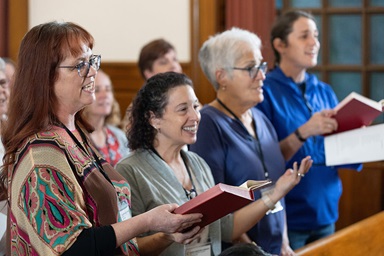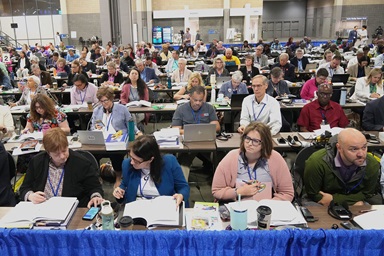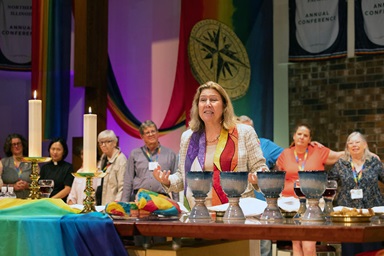Key points:
- The United Methodist Church’s top court has ruled on questions from the Council of Bishops about the coming General Conference, now scheduled for 2024.
- The bishops had asked about filling delegate vacancies and whether another General Conference needs to be scheduled after the postponed 2020 General Conference takes place in 2024.
- The Judicial Council also has released two other rulings, including a memorandum about complaints in the Congo Central Conference.
The United Methodist Church’s highest court has opened the door of some new delegates to be elected to the long-postponed and potentially momentous General Conference, now set for next year.
The majority of the Judicial Council also ruled that to put the General Conference’s quadrennial schedule back on track, another session of the denomination’s top lawmaking assembly must be scheduled between Jan. 1, 2025, and Dec. 31, 2027. Four of the nine members dissented from that part of the ruling.
In Decision 1472, the church court addressed questions from the denomination’s Council of Bishops arising from the unprecedented length of General Conference’s pandemic-caused postponement. The Judicial Council released that decision and two other unrelated rulings on March 21.
“Annual conferences are permitted to hold elections to fill vacancies in the General Conference delegation due to death, resignations, or otherwise, up to the maximum number of allocated delegates,” the decision said, “provided vacancies cannot be filled with reserve delegates.”
2 more rulings
United Methodist annual conferences — more than 130 church regional bodies around the globe — are responsible for electing the lay and clergy delegates who vote at General Conference.
The coming legislative assembly — typically held every four years — was initially planned for May 2020 before COVID shut down the meeting’s venue and world travel. Now, the global gathering that draws delegates, bishops and others from four continents is slated for April 23-May 3, 2024, in Charlotte, North Carolina.
The Judicial Council previously ruled that annual conferences “are not required” to hold new delegate elections for the postponed General Conference. The number and allocation of delegates among annual conferences would remain unchanged.
In practical terms, this meant that the same delegates elected in 2018 or 2019 to a General Conference facing multiple proposals for a denominational split or reorganization could continue to serve when the session finally convenes.
But a lot has changed in the interim. Some delegates can no longer serve for various reasons including disaffiliation from the denomination amid what is already a slow-motion separation. Some delegates have seen their status change from lay to clergy or vice versa. Some conferences that were separate entities when elections took place have since merged into one.
Bishops wanted to know what these changes mean for delegate elections.
The Judicial Council clarified that its previous ruling saying elections are not required “does not mean ‘not permitted.’”
However, the church court emphasized that the precondition for any new elections is that an annual conference has depleted its pool of reserve delegates including reserve delegates to the jurisdictional or central conferences (the church bodies that elect bishops).
“When that point is reached, and only then,” the church court said, the denomination’s constitution “grants annual conferences ‘the right to vote…on the election of clergy and lay delegates.’”
The church court further clarified that if a delegate’s status as clergy or lay has changed since their election, that person is no longer eligible to serve.
The denomination’s constitution — part of the Book of Discipline, the denomination’s law book — establishes that half of General Conference delegates must be laity and half must be clergy. The constitution also mandates that an annual conference’s clergy members elect the clergy delegates, and lay members elect the lay delegates.
As with other gaps that now exist in General Conference delegations, the church court said, annual conferences can hold a new election “if the vacancy cannot be filled with reserve delegates.”
At the same time, the Judicial Council said the annual conference mergers that have taken place since delegate elections do not affect the number of delegates or their eligibility to serve.
“When two or more annual conferences unite to become a merged annual conference, the delegates duly elected by each original annual conference stand as submitted,” the church court said.
The delegate number remains unchanged until adjusted for the next General Conference, the Judicial Council said.
With the postponed 2020 General Conference now scheduled for when the 2024 General Conference was to occur, the Council of Bishops had one more question: Does another legislative assembly need to be scheduled?
The denomination’s constitution in Paragraph 14 says General Conference “shall meet once in four years.”
But the coming General Conference is now scheduled eight years after the last regular General Conference session in 2016. The special General Conference held in 2019 is not part of the regular schedule.
“Since ¶ 14 stipulates one session per every four years, another regular session of General Conference is therefore required,” the church court majority said in Decision 1472. “Under this provision, a regular session of General Conference must be convened after the adjournment of the postponed 2020 General Conference, between January 1, 2025 and December 31, 2027.”
However, Judicial Council members the Rev. J. Kabamba Kiboko, the Rev. Dennis Blackwell and Lidia Gulele issued a joint dissent to this part of the ruling.
“There is no point in using a language other than what is already in ¶ 14,” their dissent said. “This puts Judicial Council in danger of legislating rather than upholding the Book of Discipline.”
In a separate opinion, Judicial Council member Beth Capen said the meaning of the constitutional paragraph is unequivocal — not “at least once in four years” nor “at most once in four years.”
She wrote that the denomination’s very structure is quadrennial.
Any attempt to hold a regular session of General Conference in less than four years, she wrote, “will have a chaotic structural effect and the consequences will likely be far more egregious” than the difficulty caused by General Conference’s delay.
Hahn is assistant news editor for UM News. Contact her at (615) 742-5470 or [email protected]. To read more United Methodist news, subscribe to the free Daily or Friday Digests.




